https://www.bbc.com/news/av/world-latin-america-12659220
Alberto Granado, the man who accompanied the Argentine-born revolutionary Che Guevara on a motorcycle trip across South America in the 1950s, has died in Cuba at the age of 88.
Their trip across the continent inspired Guevara's radical ideals and was immortalised in the 2004 film "The Motorcycle Diaries".
Michael Voss reports reports from Havana.
https://www.bbc.com/news/world-latin-america-29396873
New Che Guevara diaries published
Cuba has published the diaries that the revolutionary icon Ernesto Che Guevara kept during the guerrilla campaign that brought Fidel Castro to power in 1959.
His widow, Aleida March, said she had decided to publish the writings unedited.
Michael Voss reports from Havana.
Published
After 50 years of silence, Che Guevara's brother reveals the man behind the myth
The image doesn't need to be described because it's ubiquitous.
It's a 1960 photo of Che Guevara by Castro's official photographer, Alberto Korda, and it's one of the most copied and recognizable images of the past century. It even has a name, "Guerrillero Heroico," and since Guevara's execution 50 years ago, the image has become an avatar for vast and contradictory ideas.
But Che Guevara's brother says it's an inaccurate illustration of the man himself.
"It's not really representative of the person that I know. Neither Ernesto, my brother, nor Che Guevara. In all the photos that our family has of him, he's either smiling or he's looking ironic or he's looking comical."
Juan Martin Guevara, 72, is speaking to me from Buenos Aires. His eldest sibling, Ernesto Guevara was 15 when he was born. In his memoir, Che, My Brother, Juan Martin remembers Ernesto as a mercurial and prodigious figure. He was just five years old when Ernesto set out on the first of his formative motorcycle expeditions exploring South America.
Che Guevara's early years, in photos
"He was forever coming and going," Juan Martin writes.
By the time Juan Martin was 12, his brother was fighting a guerilla war alongside Fidel Castro against the Batista regime and then suddenly he was famous. He was Che.
"From 1957 onwards, I was the brother of the legendary Ernesto Guevara, Fidel Castro's companion and a fearless warrior. And then a legend. I learned to live with this."
Ernesto and Juan Martin and their father Ernesto in 1943 or '44. (Courtesy Juan Martin Guevara)
The pre-Che years
Juan Martin says his family's story can be divided into the pre- and post-Che years, a line drawn by history and the fame or infamy of his brother the revolutionary. In the pre-Che years, his memoir places Ernesto at the centre of a chaotic and eccentric household.
"He was not your traditional big brother, the one that would step in as an authority figure when Dad wasn't around. He was more of a comrade, or a friend, somebody that I would play with. We would go to the soccer game together. In Spanish, there's a word compinche — you know, a buddy; a pal — somebody that's with you at all times, your sidekick."
Some have suggested that I lived in the shadow of Che Guevara. I always say, 'No, I live in the light of what it is.'
- Juan Martin Guevara
Even before Ernesto left Argentina for good, he was frequently not at home, sleeping elsewhere as he completed his medical studies. Juan Martin admits in his memoir that Che could be distant with people he loved, but remembers an older brother who was warm to his much younger sibling.
"Irony and wordplay was our bread and butter in our family. And that is something that he kept with him throughout his life."
I ask if it was difficult to share the name Guevara with such a polarizing, powerful figure.
"I mean, some people have suggested that I lived in the shadow of what Che Guevara had been," he says. "I always say, 'No, I live in the light of what it is.'"
 Juan Martin, Ernesto, and their mother in 1959. (Courtesy Juan Martin Guevara)
Juan Martin, Ernesto, and their mother in 1959. (Courtesy Juan Martin Guevara)
Humanizing an icon
There's an ambivalence that runs through Juan Martin's memoir, a desire to keep distance from the mythic image of Che Guevara while still deeply admiring his brother. For years, he and other members of his family were determined not to talk about Che.
There were practical reasons to be discrete. Juan Martin was imprisoned by the Argentinian junta for eight years. During that time, thousands of political prisoners like him were "disappeared," thrown from airplanes into the ocean, or gunned down in summary executions.
He was freed in 1983.
"You have to understand, I was in prison," he tells me this week on Day 6. "So for me to go announcing that I was Che Guevara's brother was not such a good idea, being in prison under military junta. Others of my siblings fled the country in fear. There were bombings, shooting at my home because of this being Che Guevara's family.
"I decided much later in 2009, I understood that it's good to talk and that I needed to talk."
Juan Martin believes Che is relevant to the tumultuous contemporary world, that he can motivate young people and inspire change. He's not static and distant. His memoir takes on the myth of Che.
Che will be part of the history of humanity. I think Che's ideas will continue to influence across the globe.
- Juan Martin Guevara
"Myths are terribly tough to fight against. The way I approach it is try to humanize the man and you do that by providing content by giving substance and content to the man. That way you bring his feet hopefully closer to Earth; you have more understanding of who he really was and then perhaps an opportunity that you might want to follow."
Juan Martin believes contemporary idealists will find in Che a model for action if they can see beyond the totemic imagery. He complains Che's 3,000 pages of writings have been reduced by popular culture to his motorcycle diaries. He sees a dynamism and flexibility in Che and says his "thinking was changing constantly.
"Che's gift is that he can motivate people. So we must allow his influence to reach far and wide."
 Argentine
Communist revolutionary leader Ernesto "Che" Guevara in 1964 speaking
at the World Commerce and Development Conference at the Palace des
Nations at Geneva. (Keystone/Getty Images)
Argentine
Communist revolutionary leader Ernesto "Che" Guevara in 1964 speaking
at the World Commerce and Development Conference at the Palace des
Nations at Geneva. (Keystone/Getty Images)
Che the executioner
The romantic image of Che as Marxist idealist is far from universal.
After the revolution, Che oversaw trials and executions at Havana's fortress-like prison La Cabaña. Opponents of Castro and fighters supporting Batista were eliminated. American writer and journalist George Plimpton witnessed executions that appeared to be extrajudicial. It was a bloody time.
Juan Martin, in his mid-teens, was in Havana in 1959. He attended a trial and admits he found it disturbing.
"That trial was the only trial of many trials that was actually made public and that was the atmosphere that bothered me very much. This was done in a stadium. There were more than 5,000 members of the general public present and to see that person who was being judged who is clearly an assassin and a murderer. But to see that person surrounded by the mob — it was disturbing and I was not the only one that was disturbed by it.
"It's important for me to say [Che] was not in charge of those trials and executions. There were lawyers on both sides. There was a jury. Che was neither one of those."
Understandably, Juan Martin's memoir will not be well received by critics of Castro or his revolution.
"My support for the Cuban revolutionary process is unwavering," he writes.
I wondered how he reconciles political repression in Cuba with his eight years as a political prisoner in Argentina. He says that experience deepened his connection to Che's philosophy.
But what about Cuba's political prisoners? I asked Juan Martin how he thinks they feel about Che.
"Well, I understand what you're saying, I hear it clearly, I've heard it from others but I wanted to say, clearly, there are no political prisoners in Cuba," he replies.
In fact, Human Rights Watch identifies dozens of political prisoners in Cuba's jails.
 Juan
Martin Guevara, 73, poses with the book he wrote with journalist
Armelle Vincent on his brother, late Cuban revolutionary hero Ernesto
"Che" Guevara. (Charles Platiau/Reuters)
Juan
Martin Guevara, 73, poses with the book he wrote with journalist
Armelle Vincent on his brother, late Cuban revolutionary hero Ernesto
"Che" Guevara. (Charles Platiau/Reuters)
Cuba after Castro
Cuba will change as Castro's revolution recedes in time. Che is still revered on the island, though perhaps more as an icon than a thinker or writer. For now, Korda's image of Che still towers over the Plaza de la Revolución in Havana.
Next month marks the 50th anniversary of Che's death, but Juan Martin is convinced his brother's ideas will be part of the future of Cuba and beyond.
"Cuba's history is part of humanity, like the history of the USA, which I know is going through a lot of problems right now. You know, these are all parts of history, [and] you can't parcel off history.
"Che will be part of the history of humanity. I think Che's ideas will continue to influence across the globe."
https://www.bbc.com/news/world-latin-america-41510650
Ernesto Guevara: How my father inspired my Cuban motorcycle tours
By Will Grant
Cuba correspondent, BBC News
Published
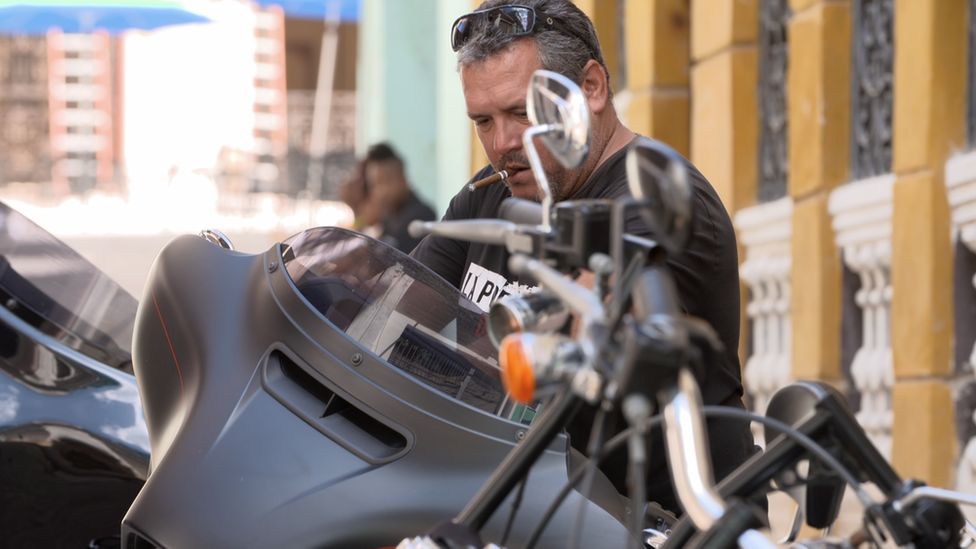
On 9 October 1967, guerrilla leader Ernesto "Che" Guevara was executed in Bolivia. Fifty years on, the BBC's Will Grant takes a motorbike tour of Cuba with the leader's son and asks him about the pressures of living under his father's legacy.
At times, the family resemblance is uncanny.
The stubbly beard, the unmistakable nose, the similarity extending down to a smouldering cigar clasped firmly between his forefingers.
Beyond the physical attributes, the youngest son of Latin America's most recognisable revolutionary, Ernesto "Che" Guevara, has inherited another trait from his late father: his love of motorbikes.
"I've always liked mechanics, speed, motorbikes, cars," said 52-year-old Ernesto, named after his father, over a cold drink in a Harley Davidson-themed bar in Havana.
"As a child I was interested in repairing cars and bikes. I suppose it's something I picked up from my old man but wherever it's from, I love it."
Despite the shared passion, the younger Guevara has taken a very different path in life: into tourism.
He runs a motorbike tour company whose only link to Che is in the name, La Poderosa Tours after La Poderosa, the famous Norton 500cc on which his father crossed the Americas in the Motorcycle Diaries.
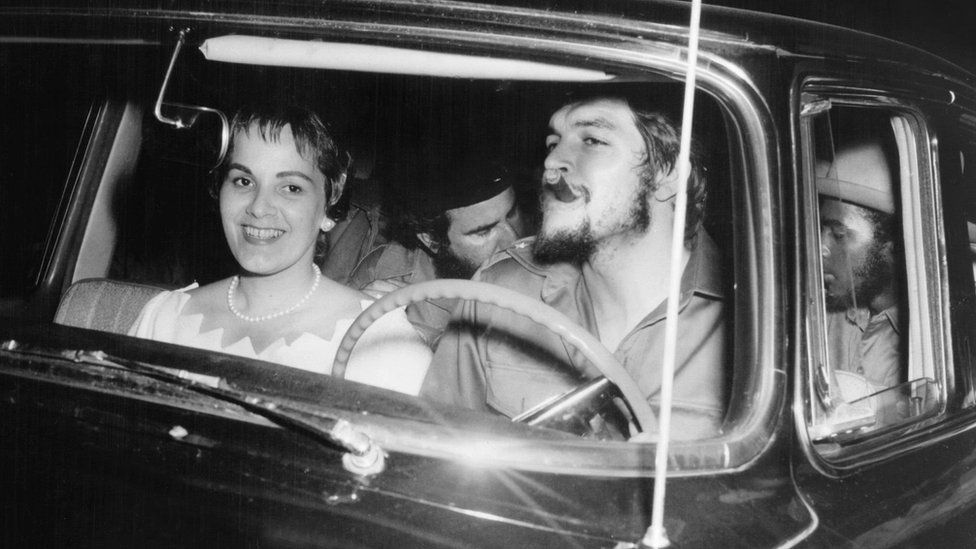
Image source, AFP
La Poderosa Tours is a private company using foreign capital and works with several state-run Cuban companies. It is part of the wave of private enterprise permitted under rule changes by President Raul Castro in 2010, and a far cry from Ernesto's training as a lawyer.
When I joined him on a recent tour, we headed out west, towards the tobacco-growing region of Pinar del Río.
Heads turned on the streets of Havana as the fleet of Harley Davidsons swept out of the capital.
The motorbike is proving an increasingly popular way to see the island. The tour group was a broad cross-section of nationalities including riders from the United States, China, Britain and Argentina.
"Americans my age have never been able to come to Cuba and now we can," reflected amateur bike enthusiast Scott Rodgers from Massachusetts when we stopped for coffee.
"I don't know long that is going to last so I thought I had to jump through this window while I could."
Others were directly drawn to the link to Che, including Eduardo Lopez, a fellow Argentine.
"Of course he is part of the attraction," Eduardo said. "Travelling the world by motorbike is my hobby but we specifically came on this tour because Che lived for years in my home town of Córdoba. So we feel a link to this myth, this figure."
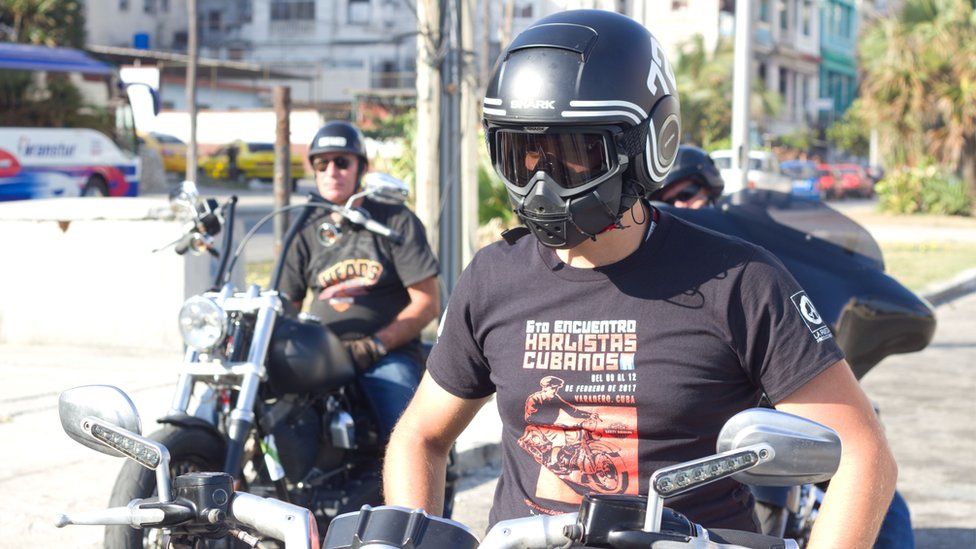
Despite the famous surname, Ernesto insists he is very much his own man.
"I always try to not link things. Anything I've achieved I've done as Ernesto Guevara March - as myself, as a human being," said the son from Che's second marriage to Cuban Aleida March.
"I do everything with a sense of responsibility. If it works out, then great. If not, fair enough."
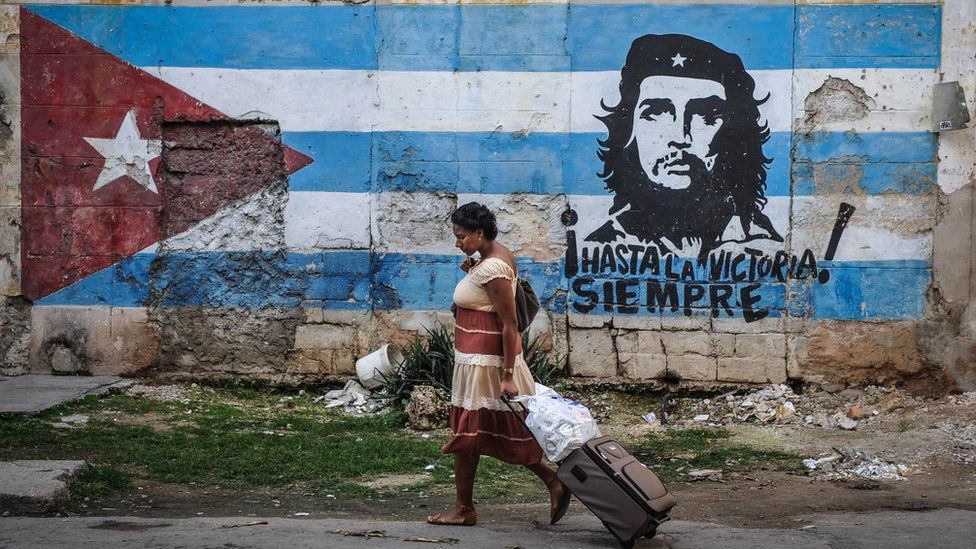
So far, it's a business philosophy that has served him well. Last year saw record numbers of tourists visit Cuba and business at La Poderosa Tours is brisk.
He knows he has his critics though, particularly in Miami. It is often pointed out that after being born with such Marxist credentials, the younger Guevara has made a capitalist's career in tourism.
It's not a charge that worries him, however.
"It has nothing to do with whether it's socialist or capitalist," he argued with a hint of indignation in his voice.
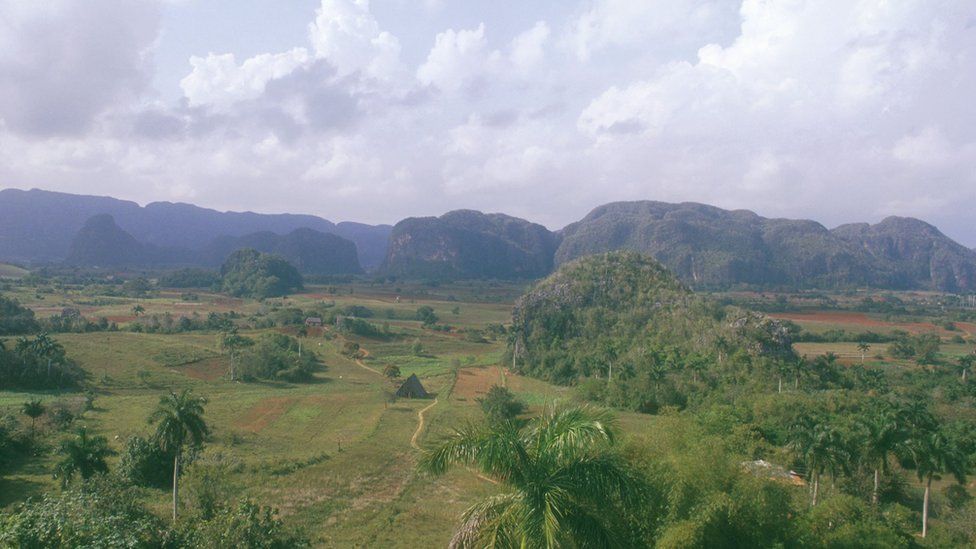
"It makes no sense to focus on that issue. For me, we're doing a good job, one that helps my country."
Our tour carried on to a place synonymous with the darker side of his father's image, the Cabaña Fortress.
It was here that after the revolutionaries took power, Che presided over the revolutionary trials of members of the ousted military government. Dozens were executed in what critics of the Cuban Revolution say was summary justice.
Fifty years after his father's death, Ernesto still leaps to his defence insisting the trials were "normal". I pointed out that such a view will incense some families the other side of the Florida Straits.
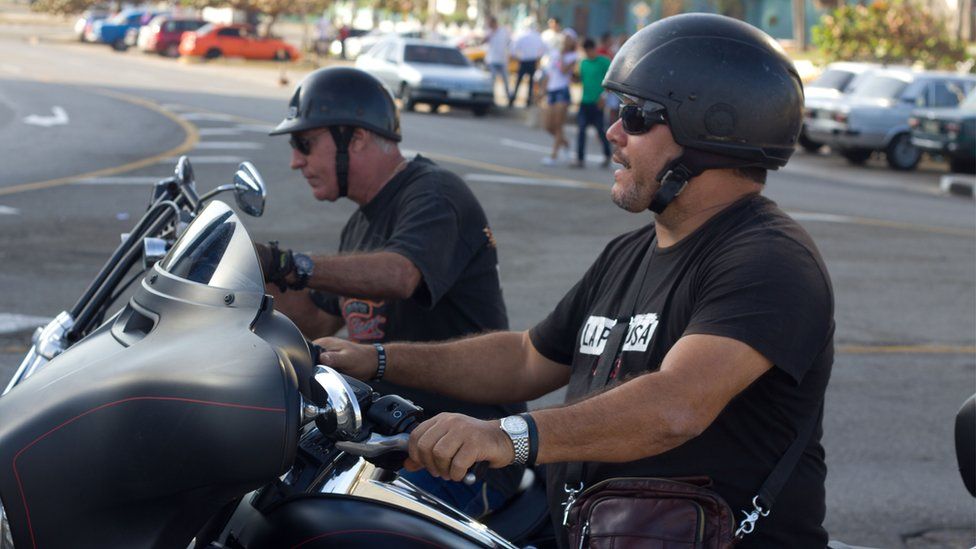
"The enemy can say what he likes. The people of Cuba know why it was done, how it was done, and above all in order to bring tranquillity to all Cuban society that they weren't going to pardon murderers of that kind," he said looking out across the bay to Havana.
"So I'm very calm, my soul is at peace, and my father's soul is too."
Ernesto readily admits it wasn't always easy growing up with a famous father - or rather, without one. Che Guevara was executed in Bolivia in 1967 when Ernesto was just two.
"Of course, at school sometimes you'd be pointed out as 'Ernesto Guevara', but generally you were known as 'Ernesto Guevara March', which is the person you are. The son of both your father and your mother."
And as the worldwide fascination with his iconic father shows no signs of slowing down, this has become a point the younger Ernesto is keen to stress.
"Those who love me, love me for the person I am. Not just for the name Guevara."
https://lapoderosatours.com/about-us/
About Us
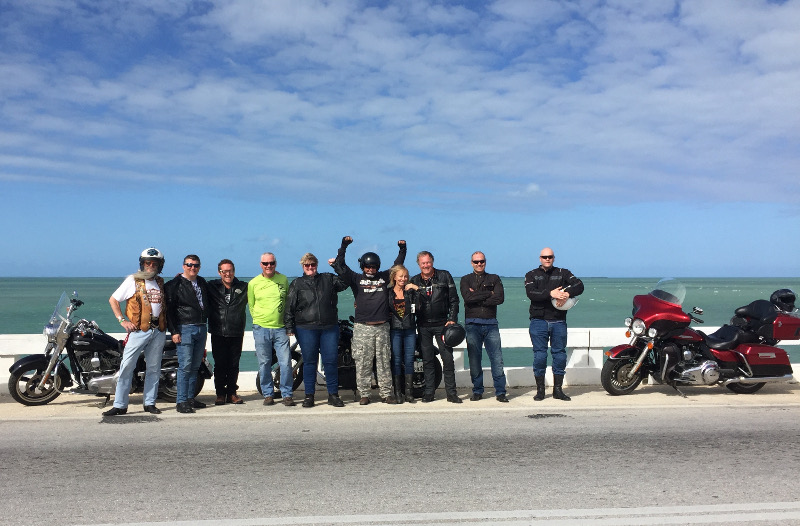
The fleeting and the eternal while travelling the roads of Cuba.
LA PODEROSA TOURS is
a travel agency which specializes in motorcycle tours around the island
of Cuba on Harley Davidson. The agency was created by a group of
professionals who came up with a form of offering original and
unforgettable motorcycle journeys combining luxury with simplicity. We
count with our own fleet of different models of Harley Davidson
motorcycles. The circuits combine the pleasure of seeing the varied
landscapes of the beautiful island of Cuba, with close contact with its
unique people and their wonderful traditions and customs and with a part
of the history of a unique Revolution, which has given birth to a
mystique that still lives on and has gone far beyond the geographical
limits of the island. The name LA PODEROSA, which means ‘the Mighty One’
in English, is no exercise in vanity: it’s the perhaps ironical nickname with which the young
Ernesto “Che” Guevara de la Serna called the motorbike on which he
travelled around Latin America: a trip immortalized in the famous movie
The Motorcycle Diaries.We personally take care of every detail during
this adventure and make sure we treat riders as our brothers and sisters
making of their trip a unique experience and an indelible memory.
Motorcycles
We offer Harley-Davidson motorcycles , checked before each trip by our team of mechanics. Insurance and Liability included. During the whole trip we offer an air-conditioned support vehicle for the travelers and their luggage. A complete tool kit and spare parts are available for any mechanical emergency to assure the success of your experience. Spare motorcycles also accompany our journey.
Our team
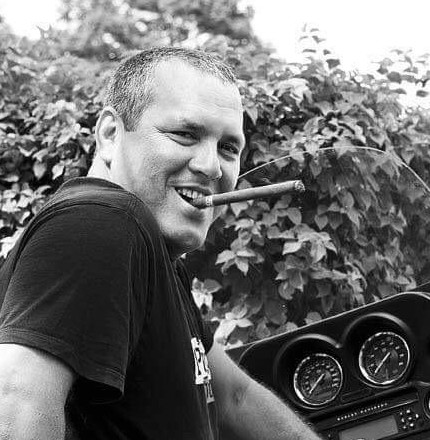
Ernesto
Coordinator and motorcycle Tour Leader: A lawyer by profession, he inherited from his father a passion for motorbikes, on which he has travelled around the country and discovered it like nobody else. As a lover of Harley bikes in particular he has dedicated over 20 years to restoring them. His favorite is a 74 model Harley Davidson Panhead, dating back to the 1960s.
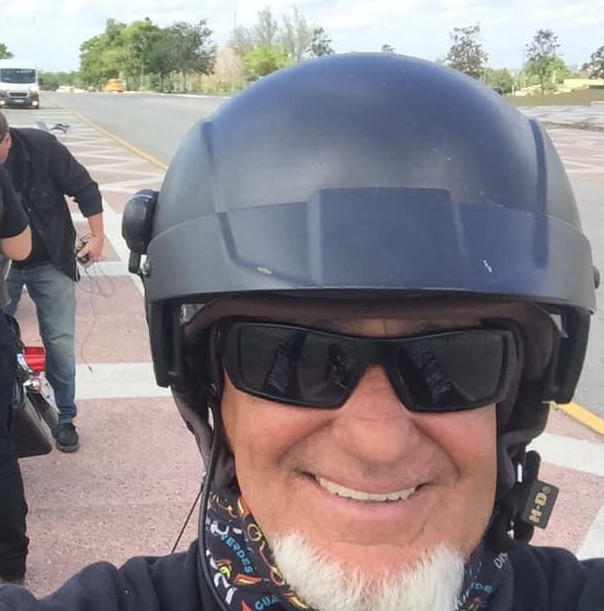
Camilo
Motorcycle Tour Leader: a childhood friend of Ernesto’s, they not only share the legal profession but Camilo also shares Ernesto’s passion for motorbikes. He spends his free time restoring them and rides among other, a 1947 Flathead, model 74.
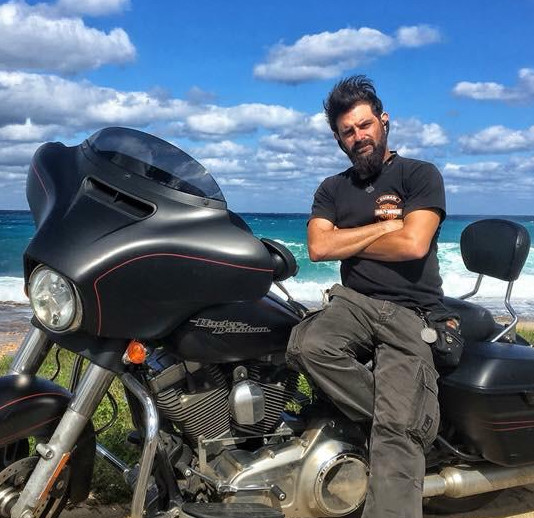
Luis
Is a designer and musician (plays the bass with his rock band) and is also a classic motorcycle aficionado. He is an experimented motorcycle Tour Leader, not only on Harley Davidson and Touring bikes in general but also in dual purpose motorcycles. He rides a 1947, Flathead model 74.
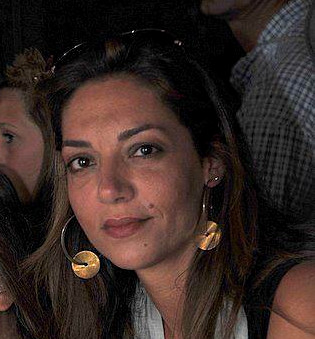
Maria Elena
Is the General Manager of the agency and the person who will answer all your questions and doubts. She will help you book your trip and customize it if necessary, responding in one of the following languages: English, Spanish, French, Italian or Greek
info@lapoderosatours.com | +5353208636


No comments:
Post a Comment